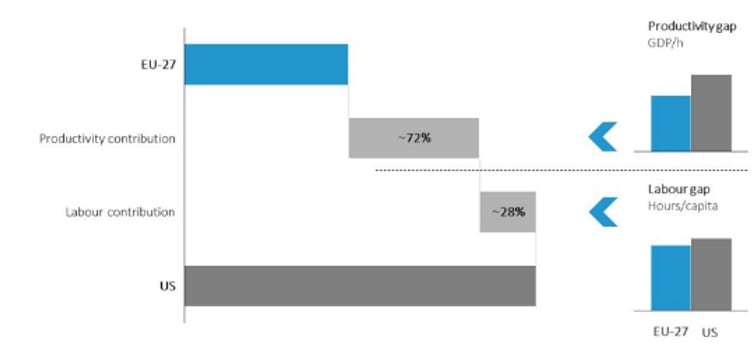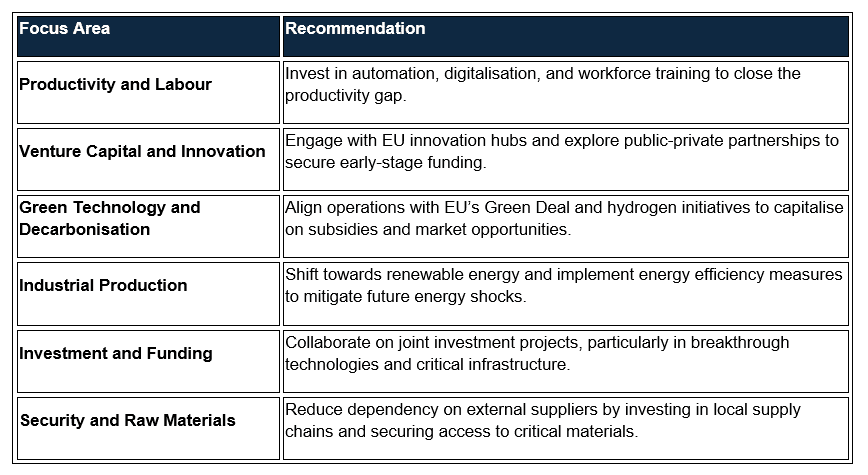The European economic model is undergoing significant transformation, marked by disruptions in energy security, geopolitical stability, and technological competitiveness. The foundational benefits of low-cost Russian energy and geopolitical safety that the EU once enjoyed have largely disappeared. Additionally, Europe's position in the global technology race has been inconsistent, with notable gaps compared to its competitors. For internationally active businesses seeking to expand into or within the European Union, understanding these shifts is crucial for developing a robust strategy.
In this environment, Mario Draghi (former European Central Bank President and one of Europe's great economic minds) has proposed comprehensive plans to address these challenges and turn the tide for the EU economy. Draghi’s vision acknowledges past missteps, particularly in energy reliance and delayed investments in technological sectors, but it also outlines a path forward that presents immense business opportunities. As Europe seeks to reform its economic policies, companies operating in or entering the EU can align with these new priorities, positioning themselves to benefit from a renewed focus on innovation, green technology, and industrial security.
This article is written by Mourad Seghir ([email protected]). Mourad is part of RSM Netherlands Business Consulting Services with a specific focus on Finance & International Trade.
Draghi’s proposals underscore the necessity of sector-specific strategies in the EU's trade and industrial policies. By identifying where Europe has lost its competitive advantage—such as in solar technology—and where it retains strongholds, such as the automotive sector, Draghi seeks to create a targeted approach to growth and investment.
Draghi’s Vision: Reform and Realignment for European Growth
Key to his vision is the distinction between sectors where the EU should accept imports, such as solar panels dominated by Chinese producers, and those where the EU must secure its own capacity. The automotive industry, employing around 14 million people, remains a critical area that requires a level playing field to maintain jobs and economic output. Meanwhile, sectors like battery technology and hydrogen energy are seen as "infant industries" that need protection from foreign competition to foster innovation.
Moreover, Draghi has called for increased EU security through greater access to critical raw materials and digital services, as well as collective investment in the defence sector. This aligns with the broader goal of reducing dependencies on external suppliers, particularly from regions where overreliance could compromise EU security and economic stability.
Productivity and Innovation Gaps
Europe’s productivity gap remains a significant challenge. Figure 1 (GDP per capita gap) highlights the substantial disparity between the EU and the US, where productivity accounts for 72% of the difference. Labour contribution, while also lagging behind, represents only 28% of the gap, signalling that operational efficiency and technological adoption will be the key drivers of European growth going forward.
Figure 1: GDP Per Capita gap 2023 (EUR)

Source: AMECO, 2024
At the same time, Europe’s venture capital ecosystem lags significantly behind that of the US, especially in later-stage investments. Figure 2 (Venture Capital Investment by Development Stage) shows that European businesses receive far less funding compared to their US counterparts. This underinvestment restricts Europe’s ability to compete globally in innovation-driven sectors.
Figure 2: Venture capital investment by development stage (USD billion, 2023)

Source: Pitchbook data (2023)
Industrial Production and the Role of Green Technology
Industrial production across the EU has faced considerable disruptions. Germany, often seen as the economic engine of Europe, has experienced sharp declines due to energy shocks, input shortages, and weakened demand. According to Oxford Economics (2024), German industrial production is currently more than 15% *lower* than at the end of 2017. The decline is broad-based and similar in other EU countries. These challenges underscore the necessity for Europe to pursue decarbonisation aggressively, focusing on sectors where it has an edge, such as green energy and hydrogen technologies.
Figure 3 (The EU’s Position in Complex Technologies) further emphasises Europe’s strength in green technologies such as hydrogen and wind power. While the EU lags behind the US and China in digital technologies like AI, IoT and quantum computing, its leadership in renewable energy and environmental technologies presents a clear opportunity for businesses focused on sustainability and decarbonisation.
Figure 3: The EU’s position in complex technologies

Source: European Commission, 2023
Decarbonisation and Energy Security: The Strategic Shift
A critical component of Draghi’s vision is the EU’s push toward decarbonization. Europe’s commitment to achieving net-zero emissions by 2050 provides a roadmap for industries aligning with sustainability goals. Draghi’s proposals include significant investment in clean energy infrastructure, particularly in hydrogen—a field where the EU is competitive. These investments are essential for meeting climate goals and reducing Europe’s reliance on external energy sources, a vulnerability exposed by the recent geopolitical shifts.
However, Draghi’s approach to energy security goes beyond green technology. He advocates for greater EU autonomy in critical sectors, reducing dependencies on foreign suppliers and ensuring that Europe controls its own industrial and technological future. This strategy, which includes enhanced access to raw materials and digital services, aims to safeguard European industries from external shocks while promoting local innovation.
Investment and Funding: A New Era of Capital Mobilisation
One of Draghi’s most ambitious proposals is a surge in investment, with a recommended EUR 750-800 billion in additional annual spending. This represents an unprecedented 4.5-5% of EU GDP and is aimed at boosting growth through both public and private capital. While slightly inflationary, Draghi argues that this investment is necessary to keep pace with global competitors like the US and China.
He further highlights the need for the EU to reform its budget and consider common debt mechanisms to unlock capital across member states. This would not only facilitate joint investments in critical sectors such as defence, green technology, and digital infrastructure but also help create a more integrated European capital market.
Thought Leadership
Based on the analysis of Draghi's report and the current market dynamics, the following focus areas are crucial for businesses to align with and benefit from the EU's strategic plans:

Additionally, we have written an energy transition report that helps businesses understand the Net-Zero goals and the latest developments in the EU regarding the energy transition, providing a solid first step for companies looking to enter the decarbonisation space. See more.
Conclusion
As Europe starts economic reform and technological realignment, businesses must adapt to evolving market conditions. The EU's vision offers a clear framework for this transformation, and companies that align with these priorities—particularly in areas like green energy, digitalisation, and industrial security—will be well-positioned to thrive in the coming years.
The EU’s renewed focus on strategic investments and reducing external dependencies presents a unique opportunity for businesses to expand their operations and tap into emerging sectors. However, navigating these changes will require careful planning, a commitment to sustainability, and a willingness to innovate within the EU’s evolving industrial policies.
RSM is Thought Leader in the field of International Trade consulting. We offer frequent insights through training and sharing of thought leadership that is based on a detailed knowledge of regulatory obligations and practical applications in working with our customers. If you want to know more, please reach out to one of our consultants.

